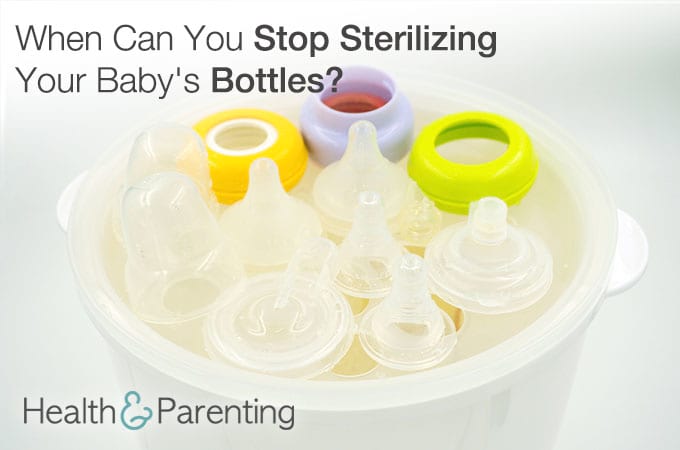If you’ve been taking baby advice from your mom or grandmother, you’ve probably received lectures about sterilizing your baby’s bottles. “It’s not enough just to clean them,” they tell you. “You need to sterilize them too.”
So perhaps you bought one of those fancy sterilizers online. Or maybe you’ve been using the microwave and hot water to do your sterilizing every week. The good news is, you’re not doing anything wrong. Conventional wisdom used to suggest that you should sterilize your bottles until your baby was about a year old, to protect them from germs that may not be washed away with simple cleaning.
But these days, most pediatricians will tell you that after the first use, sterilizing isn’t necessary. Unless you live somewhere with a contaminated water supply, washing your bottles after every feeding with soap and warm water will do the trick.
You’ll never be able to stop that—for all the same reasons you should be washing the dishes and glassware you use as well. Washing with soap and warm water is necessary to remove germs and bacteria. But that’s really all that’s necessary.
Granted, it is a good idea to sterilize your bottles when you first take them out of the packaging, just to make sure you’ve cleared out any bacteria or germs that may have accumulated while those bottles were sealed up. But after that? Routine washing after every feeding is plenty sufficient.
This same philosophy applies to nipples. Using warm water and soap for cleaning, and allowing them to air dry will suffice.
But what do you say to your mom and grandmother who want to know why you’re no longer sterilizing as they instructed you to do?
Well, you can point out that water sources are generally cleaner today than back when they were raising babies, and that most major pediatric groups are clear that there is no need to sterilize bottles or nipples. In fact, as long as a brand says those bottles and nipples are dishwasher safe, you can even leave the cleaning to that handy machine in your kitchen.
Still, for some parents, sterilizing just feels like the right thing to do. And that’s okay. Sterilizing bottles and nipples certainly won’t hurt your baby; it just takes up a bit of extra time from your day. So continue using that handy sterilizer you registered for if it makes you feel better. Just know it isn’t something you have to do in order to keep your baby safe. And even when conventional wisdom said it was, sterilizing usually stopped after one year of age.
Written by Leah Campbell, infertility advocate, adoptive mama, writer and editor. Find me @sifinalaska on Twitter.
This information is not intended to replace the advice of a trained medical doctor. Health & Parenting Ltd disclaims any liability for the decisions you make based on this information, which is provided to you on a general informational basis only and not as a substitute for personalized medical advice. All contents copyright Health & Parenting Ltd 2016. All rights reserved.










